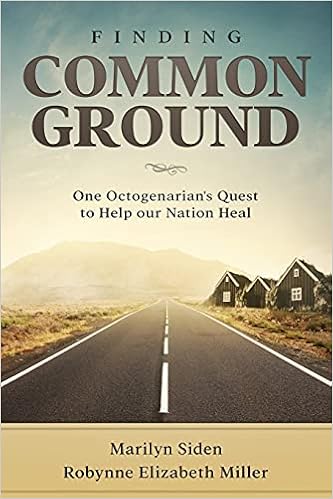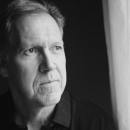Marilyn Siden has lived through much: the aftermath of World War II, Korea, and the horror of Vietnam. She's navigated good political administrations and struggling ones, a thriving economy and want. Her eight decades of experience living in the US have shown her the best America has to offer and, unfortunately, the worst. But she never thought America would become a place of vitriol and despair. So, she decided to do something about it.
Marilyn Siden and Robynne Elizabeth Miller have written about Marilyn's epic journeys in the brand new book Finding Common Ground (click here to purchase the book). Through a series of epic journeys across America, Marilyn discovered what she was after: practical advice on how to help our nation heal. But she found something she wasn't expecting . . . something far more powerful. Marilyn found our common ground.
We are honored to catch up with Marilyn to talk about this common ground and her new book
Q: Marilyn, thanks for doing this interview with us. Let's start with yourself: tell us a little bit about who you are.
I am blessed with a wonderful family-four grown children, twelve beautiful, talented, Godly grandchildren, and an amazing husband.
I taught elementary school for seven years, outdoor education for five years, and for thirty-seven years served vulnerable children in a camping ministry as Executive Director of Today's Youth Matter in California and Program Director and Executive Director of Wilderness Trails in Oregon. I've taught classes and seminars throughout the US and have spoken on radio, television, and in churches of all denominations about kids who are struggling because of abuse and neglect. In 2017, Potholes in the Pavement, Inspiring Tales of Vulnerable Children was published. Finding Common Ground, co-authored with Robynne Elizabeth Miller, was published this year.
I have a deep love of music, little plants that bloom in impossible places, anything out-of-doors, occasional backpacking, swimming, reading, and pelicans.
Q: What made you, at nearly 80, decide to set out across America to see if you could find answers to our nation's issues?
For over a decade, I've been aware our country has been moving in an unhealthy direction toward division and polarization. We have forgotten how to speak with civility, humility, and decency. It is reminiscent of our Vietnam era where our country was ripped apart over a war many could not understand. We did not treat our soldiers very well when they returned home, and it was decades before we decided that was a mistake.
Perhaps I held out hope our elected officials in Washington DC-elected to represent all of us-might come up with solutions to our divisiveness. But they seem to be unable to solve pressing problems while dealing with their own party politics and policies. Subsequently, I had to find out for myself if this was just a west coast thing, or was our entire country equally divided on important issues. And, if it was, what solutions were out there to heal our deep national rifts.
So, that's what spurred the decision to travel across our nation and see what different parts of the country had to say. It didn't take long to recognize that everywhere there was discord, and at the same time, a deep desire to do something to turn things around.
Q: What were some of the questions you were asking?
I asked but one question: If you could think of one or two things that might heal our divided nation for the common good, what would it be? Then I stopped talking and just listened, avoiding adding my two cents worth to the ensuing conversation. By the time my journey ended, I talked to perhaps four hundred people, traveled thousands of miles, and tried to take as accurate notes as possible. No one was rude or dismissive, and all genuinely wanted to do something. Even those who had no clear direction or ideas agreed they were ready to roll up their sleeves and go to work if an idea was put in front of them.
Q: What were a couple of your most interesting experiences?
Visiting the pristine, well-manicured Westboro Baptist Church in Topeka, Kansas with its locked gates, high fences, 24-hour surveillance cameras and condemning signs hung in strategic places left me speechless. Clearly, they had drawn a line in the sand, so to speak. They appeared to be a one-issue church that defines who they are and what they stand for. Directly across the street was a small unassuming house, aptly named "The Rainbow House" for its stand on homosexual issues. While their signs placed in strategic places across the property were welcoming, it too was locked up to the outside world. I met a father with his three children on the sidewalk near the Rainbow House, and when I posed that one question as to where we might find common ground, he responded as he pointed across the street, "I'm a Catholic, but I have to wonder which lawn Jesus would be sitting on." No question both lawns-the bright green, well-manicured one and the dried, brown one-needed some divine intervention. I left with the distinct observation that when we become so myopic on any issue important to us, our stand on that issue blinds us from having any chance to find even a hint at common ground.
On another occasion, I found myself in a slow line at a grocery store. The woman holding up the checkout process was trying to purchase two bananas with a debit card. The cashier was having none of it, so the woman dug into her purse looking for enough loose change to pay for her two items. Finally she muttered, "I'm sorry," left the bananas on the counter and started to walk away. The young man standing behind her evidently heard her dilemma and immediately spoke up. "Add them to my bill."
The woman thanked him profusely before taking her bananas and leaving the store. The cashier couldn't believe his act of kindness and let him know what an amazing thing he had done. The bananas were thirty-three cents each, so for a whopping sixty-six cents investment, the stranger had demonstrated how easy it was to lend a hand, build community, and model generosity and respect. For his part, the cashier had modeled what calling out the good in people was all about. As I made my way to my car, I thought about what the man had done. More than that, I thought about his parting remarks. With simple humility and a gentle smile, he had looked at the cashier and whispered, "Pass it on."
Q: What was the "Common Ground" that you found most often from your travels?
Most people agreed that our government is probably not the answer; that if things are going to change, it most likely will come from individuals living in local communities rolling up their sleeves and pitching in. I heard on multiple occasions-said in many different ways-we must learn to really listen to each other and stop pointing fingers. Another theme was seeking ways to dissipate the anger that seems to invade our lives at every turn. We all have a responsibility to reach out to the lost, the last, the least, and the left behind.
Repeatedly, there were calls for all of us to stop being so judgmental and learn to accept others no matter what their circumstances. One woman summed it up. "Aren't we supposed to love one another? Isn't that what we were taught growing up?"
There are many people already doing something on a large or local scale-the retired dentist I saw with his garbage sack picking up trash. He commented, "I used to clean teeth. Now I clean streets." Then there was the older woman sharing her breathtaking garden to all passing by with gifts of flowers and a smile. She said, "I think we need to smell more flowers. How many angry people do you see smelling flowers?"
So, the common ground was that most Americans actually want the same thing ... strong communities, safe environments for their children, opportunities, etc. If we can look at people with that in mind, mutual respect, solutions, and common ground are fairly easy to see ... and achieve.
Q: How have you personally changed in researching and writing this book?
From the first day, I was convicted to do way more listening than talking. That has carried over since writing this book. Notice the small things, and pay more attention to others. Look for ways every day to compliment others, even in the smaller things. Judging others is not my job. That should be reserved for God and God alone.
Q: What are some messages you hope readers will be able to take away after reading your book?
It is my hope readers will feel a call to action and the empowerment to do something. What that looks like rests with the individual. For some, it may come in the form of greeting a new neighbor or talking to a stranger or simply picking up the trash they see when out for their evening walk. For others, it may be much more time consuming or practical. We might decide to visit a nursing home regularly, foster a child, prepare meals for the hungry, start a recycling program, or build homes for the homeless. Together we can make life altering differences in our communities. And, eventually, it may spread across our country where we can all claim our common ground.
The point is that we all can, and should, be a part of the solution.
Q: What's next for you in terms of books?
Right now, I am putting the finishing touches on a trilogy of adventure stories for middle grade readers. Robynne and I are also working on another collaborative effort with a working title of Twenty Things We Wish We Knew Before Reaching the Age of Forty. There may be another book as a follow up to Finding Common Ground researching what so many people are already doing across America-and there are many efforts going on right now.



















